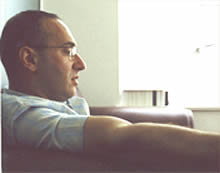
What about exhibition?
We will get involved in any way that we can. It's not a part of my remit, there are other departments dealing with it but we are automatically involved in it. We live in a country that is almost completely market driven with no arthouse circuit - it's an exhibition system that relies on films having a good opening weekend.
It's the same in America, but there you also get films like Memento edging their way up the charts on a few screens through word of mouth alone.
It's the same as it is here but by being such a big country the numbers can work. It's a similar argument to black or hispanic filmmaking, a company in the US can produce a film for an entirely black audience and it can work, there is an audience there and one that is very supportive of that kind of film. We just don't have the numbers here. What we try to do is get producers to think about their audience a little bit more.
Which films do you think have been targeted successfully?
Trainspotting, Human Traffic - there aren't many that's for sure and they don't have to be silly or daft, but in the same way music can speak directly to a certain audience, film can too.
Other than through training, how do you get young people into the industry?
Well everything is a chicken and egg situation and there isn't a three, six or nine step plan to achieving something. It has really got to be happening at the same time. We have to bring budgets down so we can take more risks and make a broader range of films. That has to happen to make the industry more appealing. We have to get film on the agenda more in schools, the quantity and quality of training has to increase. The coherence of a nation-wide training programme will, for the first time, bring all of those schemes under one roof - it all has to happen at the same time. And it will probably take five years or more to see any improvements but as long as people are thinking along the right lines then we'll have a chance to achieve it.

Can we talk a little bit about your career before you started at the Film Council? How did you get into the film business?
Well I was a professional musician originally and that just didn't work out. I just fell into the film industry really. Someone owed me a favour and I started selling videos over the phone when Palace was only a month old. I was upstairs at the Scala in Kings Cross, overlooking the cinema. It was a good job, I knew nothing about film although I was interested in it and at lunchtimes I'd go over to the cinema. I was very lucky in that I joined a very promising company only a month after it started that really felt its way along for 10 odd years without ever being properly funded or financed. It was run by a bunch of very young and enthusiastic people, it wasn't arrogance that made them do things differently, it was the fact that we didn't know any better.
As we hadn't been established for a number of years films didn't need to fit into the way we worked - it was more a question of this film needs to be handled this way so we have to fit the film. In that way we had a big effect over the way films were released in terms of windows from cinema to video and the way that foreign language films were marketed. It was training that money couldn't buy because for 10 years I flitted around the company. From selling videos over the phone I went into marketing, to theatrical distribution, to selling features. It was that that led me into production - when Palace went bust I found out that I didn't necessarily have to hide under the Palace name but that I was able to go out on my own. I got a contract with Polygram to acquire independent projects rather than go out and get another job. I started to buy for about seven countries which really broadened my knowledge. Part of my job was also to hunt out new talent which led to The Usual Suspects, which was my first baby because it was one that I did from beginning to end. Although my own fuck-up meant I only got executive producer credit when I actually produced it. Then it just got too much to do acquisition and production at the same time - there's really not enough hours in the day. I decided to produce on my own, less money in it but more focussed.
It has really carried on from there and the funny thing about production, even though I've done about seven films, is that you realise that there is a bit of a ceiling in this country. Your world shrinks when you are an independent producer. Having been in acquisitions, which meant going to film festivals and having such a broad range of contacts and clients from so many countries, you have to make your own bed all of a sudden. After a while, especially after a period in development, you really start to see the industry as a whole and start to see what the possibilities are. I was lucky enough to do pretty much a film a year for seven years but I had started to wonder where I was going, what did I have to show for it? The fact that I've been suing my partners for the last three years to get some money out of The Usual Suspects, that's what I had to show! I just wondered whether I was going to own anything or would I just be getting a fee from each film.
These doubts coincided with the Film Council being formed. It was good news that there was going to be people from the industry on that board, and also good news that the thought process was the same. I firmly believe that a good production company need to have the resources and the stability to plan ahead further than their next film. To be able to develop a range of things to the stage when they are really ready to go rather than having to put a film into production just because the money is available.
Just looking at your wall, you've got the first films of Paul Thomas Anderson, Bryan Singer and Ben Hopkins. How did you discover them?
Well actually Bryan's first was a $250,000 film called Public Access. I found both Paul and Bryan at the same film festival, Paul had a short called Cigarettes and Coffee and Bryan had Public Access which actually won the jury prize at Sundance that year but no one else picked up on it. I don't know, I suppose I had a knack for finding talent and it probably came from acquisitions. It's reading scripts and seeing something, it's nothing one can quantify but that's where the gut aspect comes in. I was certainly right about those two although, personality wise, I wasn't right about Paul because we didn't get along. Otherwise I would have produced Magnolia.
Did you turn it down?
No, I just didn't get the chance to do it because we fell out very badly earlier. He's not an easy person to get along with and he doesn't require the type of producer, like me, the producer that wants to get involved. Anyway, good luck to him.
I don't know why I've always been attracted to less established talent, partly because I like the risk and partly because it lets me get a bit more involved and influence the way things turned out.

Unlike Anderson and Singer, Ben Hopkins followed his first film with an even lower budgeted one (The Nine Lives of Thomas Katz)…
He wanted me to be involved with the second film whilst I was producing Simon Magus, it's odd because Thomas Katz is a little bit like a first film but he did it second.
I think Ben is incredibly talented and he wants to make a certain kind of film but he also desperately wants an audience. I did Simon Magus because I thought he needed launching, I never thought it was going to be a particularly commercial film but it spoke to me, and I did think there was a chance it would work in a much wider way. Emotionally it was a very universal story in a very particular setting. And in actual fact it got official selection in Berlin, very good reviews and it went into release. But it was always going to be difficult, particularly as when we embarked on this journey, which must have been 1996 the environment was different. Because Simon Magus is the kind of film that needs time to build an audience and needs time to work. You know, a one screen showing at the Curzon Mayfair, followed by a couple of weeks at regional film theatres playing in rep is hardly ideal. Having said that, it did manage to get a North American sale and get released in the US and do OK. As for Ben in the future, he's certainly got ideas that are more acceptable, more commercial but he's always going to have his own voice.
How many applications to the premiere fund have you had so far?
I thought we'd get thousands but we've only had 200 odd. Having said that we've solicited the same number again, if not more. I can only assume that we got 200 because we set the bar quite high. We said that if you come to us you have to come with at least an idea of how you're going to make and sell the film.
Not everyone is going to be able to come to you with a distribution strategy in place. How much will the Film Council help and advise in this process?
I very much want us to play a part. It's a bit schizophrenic because we said we wanted them to come with a strategy or at least an idea how they will do it - I'm not going to have time to produce peoples' films. At the same time I do want us to be involved early so we can help and introduce producers to the right people, to help them keep control of the film for as long as possible and to find the right partners. That goes right through to how the development money is handled because the terms are more attractive here in terms of keeping control of the project.
I think that we can be helpful. On Mike Bassett we brought in the deal with Entertainment and the idea of putting up P&A money as a guarantee so that, whatever happens, the film will get a certain level of support. That's where British film has got the raw deal in the past, they just don't get the visibility.
Have any of the four films so far gone through the development fund?
No, and it was quite obvious from the beginning that we'll be boarding at quite a late stage of development. Having said that, we were there at the beginning with the Altman film and it kind of came together very quickly. As the fund matures I hope there will be more internally generated projects. At the same time we probably have six or seven projects that we have taken through the Development Fund and the Premiere Fund is leading the development on. And as the fund matures I hope there will be more internally developed projects.
Roughly what proportion of total budgets have you been funding so far.
So far it has been between 15% and 35%. Obviously, the bigger the budget the less part we can play but that's fine if we can get in early as it's not going to be interesting for us to come on late on a $50m film. If we can drive budgets down in some way then we'll look at whether we can fund a bigger proportion
I see that the Film Council retains approval over things such as shooting ratio. How much control do you exert?
Well we ask for a standard contract in that we want to know what we're getting. But we don't insist that they shoot it in widescreen for example - all we want to do is ensure that the producers will get the agreement from other financiers because there are budgetary repercussions for going a certain way and that means you have to address those issues creatively.

What's the biggest mistake people make when they apply?
Well, applications not being complete enough would be the only thing I can think of. Apart from not getting as many applications as we thought we'd get, we also haven't had as many problems with applications. People have been very professional and the only disappointing thing is that the quality has not been as high as we would have liked, though it has been close to what we expected. Just because these new funds are out there it doesn't mean that the quality level is going to miraculously rise.
What was quite a relief is that we didn't get the bottom drawer projects that normally come around whenever new finance becomes available.
Is your biggest problem a shortage of funds or a shortage of decent scripts?
I haven't turned anything down through lack of money so far and if that were to happen I'd be banging on John Woodward's door asking for more. We've made a couple of offers after announcing the first four, one I can't mention yet for the summer and the other a feature length animation project which is quite a long term thing. Other than that we've only got the six or seven in development but I'm not going to start panicking that I've got to spend some money.
I think we should be concentrating on some of the wider issues in the meantime.
Who would you say - directors, producers, companies - are really pushing the UK industry forward?
(laughs) I think it would probably be dangerous for me to answer that by naming names. What I wanted to get away from was an industry where you have Working Title and then everyone else. If in three years time we'd have helped 10 or 15 real production companies establish themselves like, in TV the Tiger Aspects and the Talkbacks, then we'll have done something worthwhile. I think there are already four or five that are heading that way, and people are thinking that way now. A couple of producers came in the other day saying that since they heard those intentions they were thinking of joining forces. Before I took this job I had my own production company and was thinking about merging with another company or looking for other businesses that might compliment film production.
It would just be good to have a production sector that was as professional as other sectors, and I don't mean that in a bad way, at times I was as amateurish as everyone else. But if we are going to have a more constant supply of good projects we have to have a more stable production sector.